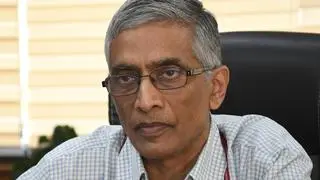The Centre on Saturday issued a notification for constituting a high-level committee, headed by former President Ram Nath Kovind, to give a report on holding simultaneous Lok Sabha and State Assemblies polls which it said was in “national interest” to avoid massive public expenditure and “disruption in development work” owing to the country perpetually being in election mode round the year.
The move endorses Prime Minister Narendra Modi’s long-held view of One Nation, One Election which he has been articulating since 2014 onwards. The seven other members of the panel for giving a report on One Nation, One Election are — Amit Shah, Union Minister of Home Affairs and Cooperation; Adhir Ranjan Chowdhury, leader of the single largest party (Congress) in Opposition, Lok Sabha; Ghulam Nabi Azad, former leader of Opposition, Rajya Sabha; NK Singh, former Chairman of 15th Finance Commission; Subhash C Kashyap, Former Secretary General of Lok Sabha; senior Supreme Court advocate Harish Salve; and Sanjay Kothari, former Chief Vigilance Commissioner (CVC).
Besides them, the notification issued by the Legislative Department of the Union Ministry of Law, stated that its minister Arjun Ram Meghwal will attend meetings as a special invitee, while Niten Chandra, Secretary in the Department of Legal Affairs, shall be Secretary to the Committee.
The panel, asked to submit its report at the earliest, has been mandated to “examine and make recommendation for holding simultaneous elections to the Lok Sabha, State assemblies, municipalities, and panchayats, keeping in view the existing framework under the Constitution of India and other statutory provisions”.
Panel’s tasks
For that purpose, the Kovind panel will study and recommend specific amendments to the Constitution, the Representation of the People Act, 1950, the Representation of the People Act, 1951, and any other rules that would require amendments for having simultaneous elections, read the Ministry of Law notification.
The panel would specifically look into and recommend, if the amendments to the Constitution would require ratification by the States; analyse and recommend a possible solution in a scenario of simultaneous elections emerging out of the hung House, adoption of a no-confidence motion, or defection or any such other event.
Similarly, the Committee is expected to suggest a framework for synchronisation of elections and specifically, suggest phases and time frames within which simultaneous elections may be held if they cannot in one go, and also suggest any amendments to the Constitution and other laws.
It would also see the aspect of logistics and manpower required, including EVMs, VVPATs, etc, for holding such simultaneous polls; recommend modalities of use of a single electoral roll and electoral identity cards for identification of voters in elections to LS, assemblies, municipalities and panchayats.
Post Independence, from 1951-52 to 1967, elections to LS and Assemblies were mostly held side by side. But, the government said, “This cycle got broken and now, elections are held almost every year and within a year, too, at different times, which result in the massive expenditure by the Government and other stakeholders, diversion of security forces and other electoral officers engaged in such elections from their primary duties for significantly prolonged periods, disruption in developmental work on account of the prolonged application of Model Code of Conduct”.
Law commission report
The government notification relies on the Law Commission of India’s 170th Report on ‘Reforms of the Electoral Laws’ and Parliamentary Standing Committee on Personnel, Public Grievances, Law and Justice findings on ‘Feasibility of Holding Simultaneous Election to the House of People (Lok Sabha) and State Legislative Assemblies’ to revert back to one poll at centre and in states every five years.
Highlights
The Law Commission observed: “..It is true that we cannot conceive or provide for all the situations and eventualities that may arise whether on account of the use of Article 356 (which of course has come down substantially after the decision of Supreme Court in S.R. Bommai vs Union of India) or for other reasons, yet the holding of a separate election to a Legislative Assembly should be an exception and not the rule. The rule ought to be ‘one election once in five years for Lok Sabha and all the Legislative Assemblies’.”
Similarly, the parliamentary standing committee has also examined the matter in its 79th report and recommended an alternative and practical method of holding simultaneous elections.
Congress MP’s reaction
Congress MP Adhir Ranjan Chaudhary wrote a letter to Amit Shah, saying that he doesn’t want to be part of Kovind panel...
“I have no hesitation whatsoever in declining to serve on the Committee whose terms of reference have been prepared in a manner to guarantee its conclusions. It is, I am afraid, a total eyewash,” he said in the letter.








Comments
Comments have to be in English, and in full sentences. They cannot be abusive or personal. Please abide by our community guidelines for posting your comments.
We have migrated to a new commenting platform. If you are already a registered user of TheHindu Businessline and logged in, you may continue to engage with our articles. If you do not have an account please register and login to post comments. Users can access their older comments by logging into their accounts on Vuukle.